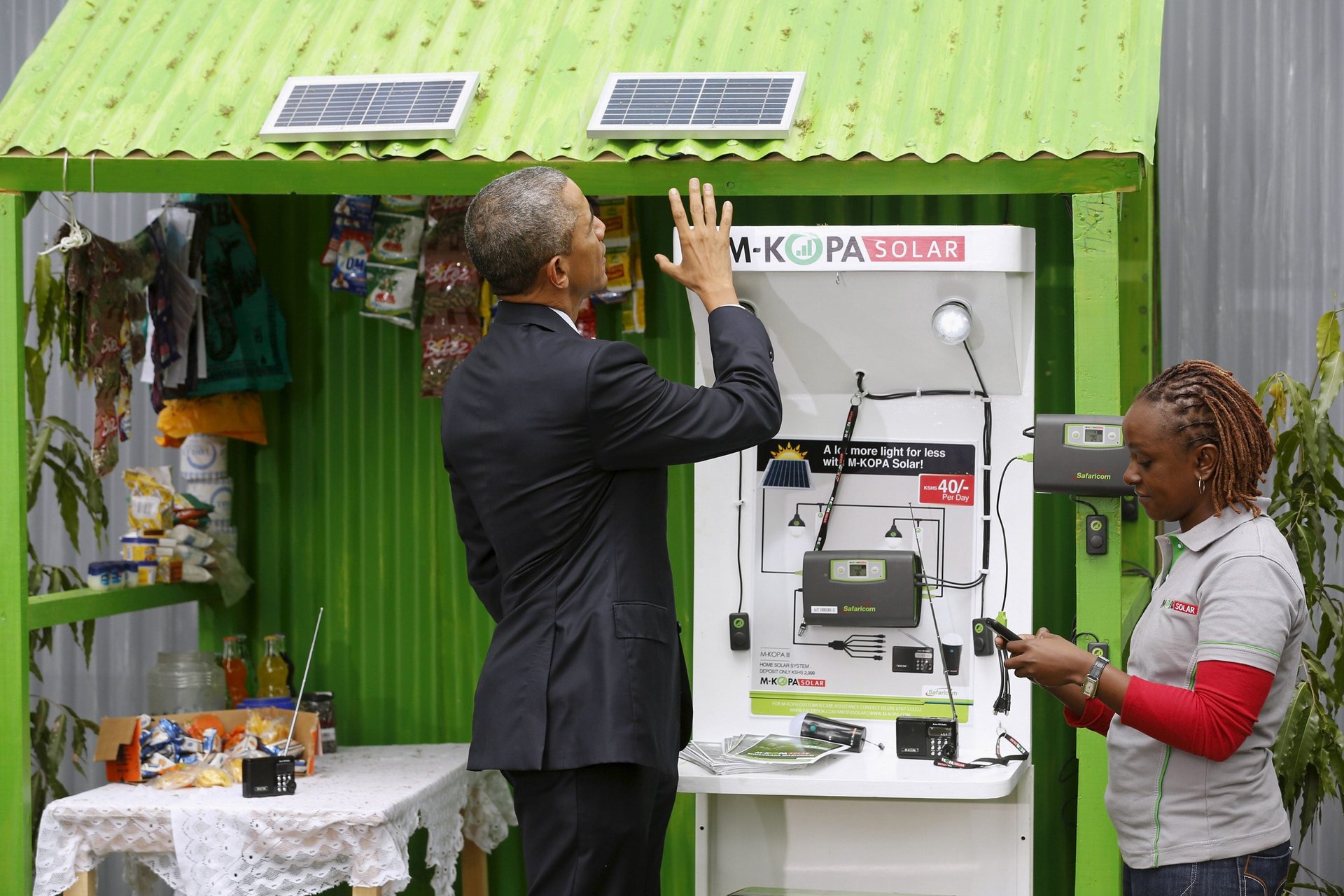Donald Trump’s climate policy could shut off electricity to millions of people in Africa
Wherever he went in Africa during his presidency, Barack Obama spoke about climate change. When he addressed the Ghanaian parliament in 2009, he talked about the “undeniable peril” of a warming planet and its effect on the continent. When he spoke in his father’s homeland of Kenya in 2015, he noted the importance of reducing emissions and promoting clean energy. When he delivered a speech later that year at the African Union headquarters in Ethiopia, he exhorted Africa’s leaders to combat climate change.


Wherever he went in Africa during his presidency, Barack Obama spoke about climate change. When he addressed the Ghanaian parliament in 2009, he talked about the “undeniable peril” of a warming planet and its effect on the continent. When he spoke in his father’s homeland of Kenya in 2015, he noted the importance of reducing emissions and promoting clean energy. When he delivered a speech later that year at the African Union headquarters in Ethiopia, he exhorted Africa’s leaders to combat climate change.
But all that—and perhaps more—is likely to become undone as Donald Trump ascends to the presidency of the United States.
Trump has in the past claimed that global warming was created by the Chinese to make the US less competitive in the manufacturing sector. Many now hope he was only joking—as he himself said afterwards. Nonetheless, Trump’s stated energy plan aims to rescind many of Obama’s executive actions to curb greenhouse gas emissions and fossil fuel consumption. In the pursuit of creating “millions of new jobs,” Trump has said he will eliminate the moratorium on coal leasing, tap into America’s oil and gas reserves, and cancel the US commitment to the Paris Agreement on climate.
If Trump scraps all of Obama’s climate change efforts, it will likely accelerate climate-related issues all over the world. But Africa, in particular, could be in trouble.
The continent emits a relative paltry amount of harmful gasses, yet is the most vulnerable to global warming and its effects. Africa in its entirety contributes only 3.8% of total gas emissions, in contrast to 23% in China, 19% in the US, and 13% in the European Union.
Temperatures in the continent are expected to increase (PDF) by 4—6 °C in the next century, and that could have far-ranging impact on economic growth. Extreme weather changes connected to global climate change could also depress Africa’s agriculture sector, which provides up to 60% of all jobs on the continent, leading to crop depletion, increased famine, and food insecurity.
Obama has also said an increase in natural disasters will lead to more humanitarian crises, creating political instability in Africa and compounding the migration crisis.
In Africa, Obama wanted to address these impending issues through key projects including the Climate Services for Resilient Development. The $34 million project was launched to train local communities in countries like Ethiopia how to plan for climate-related risks, and to provide them with the capacity to map, analyze, and understand climate data. Through the US Agency for International Development (USAID), the Obama administration also devoted millions of dollars to help African countries and communities adapt to climate change and mitigate carbon emissions. This was done by directly funding infrastructure, basic health and water services, agricultural systems, and urban planning in communities particularly vulnerable to climate change.
Obama’s signature Africa project, though, focused on promoting clean energy and investing in renewable sources like wind and solar. The $7 billion, five-year Power Africa project was aimed at providing electricity and creating 60 million new connections in sub-Saharan Africa by 2030. “It’s the connection needed to plug Africa into the grid of the global economy. You’ve got to have power,” Obama said when Power launched in 2013,
This was a lofty—and welcome—ambition, especially in a region that produces less energy than South Korea, despite having more than 18 times its population. The initiative got off to a shaky start, but has found its feet, and now supports development projects in 17 countries in Sub-Saharan Africa, including off-grid solar power in Rwanda, the first wind power project in Senegal, and Ethiopia’s first private-sector sponsored geothermal project.
In July 2015, Obama spoke to African leaders gathered in Ethiopia about the importance of ratifying the Paris Agreement and forging global relationships to turn the threat of climate change into an economic opportunity. “Because sparing some of the world’s poorest people from rising seas, more intense droughts, shortages of water and food is a matter of survival and a matter of human dignity,” Obama said.
Africa can only hope Trump heeds Obama’s message.